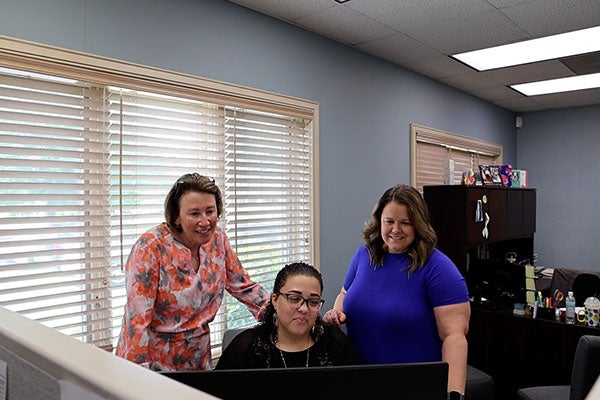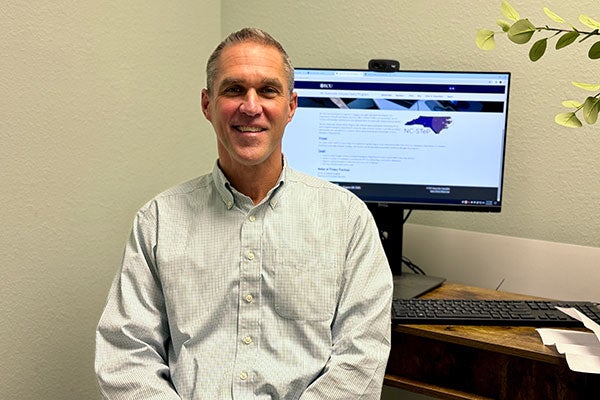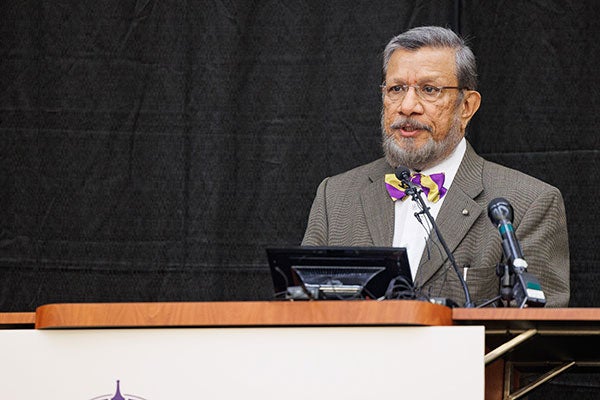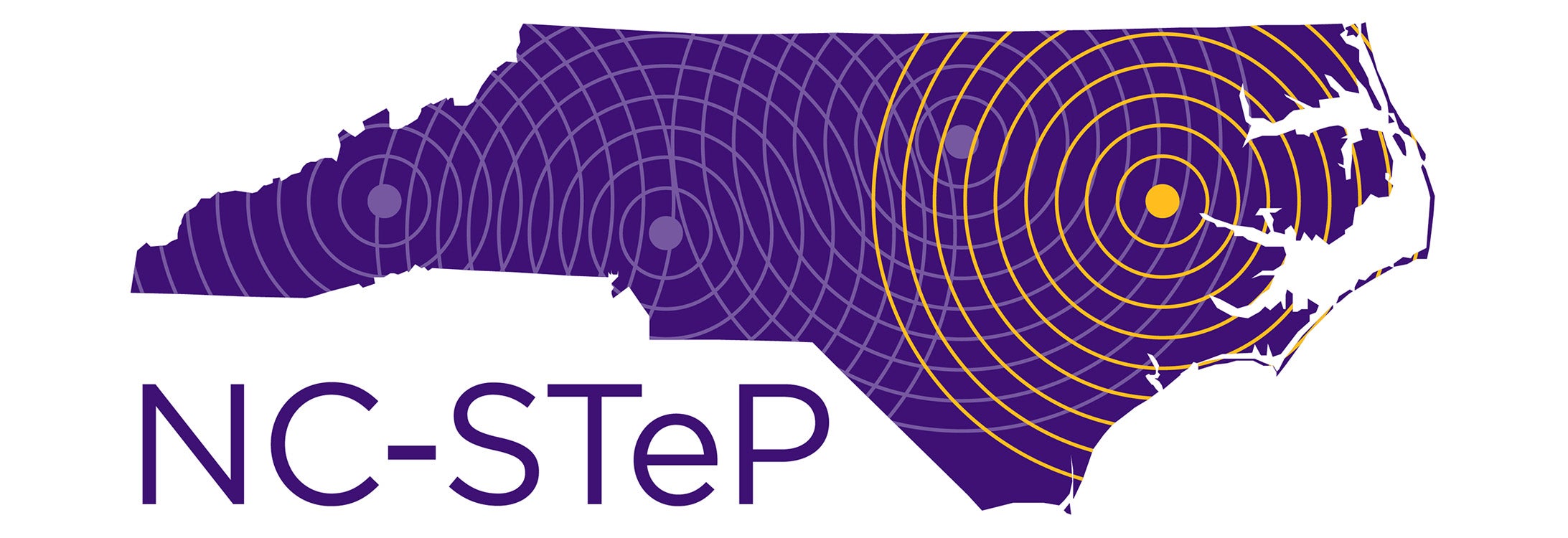NC-STeP-Peds expands access to mental health care for children
Youth across the state now have better access to mental health services as part of the expansion of the North Carolina Statewide Telepsychiatry Program (NC-STeP), an initiative of East Carolina University’s Center for Telepsychiatry.
Five pediatric primary care sites from the mountains to the coast are providing mental health care for children and adolescents through NC-STeP-Peds. Catawba Pediatric Associates, PA; Clinton Medical Clinic; ECU Pediatrics Clinic; Robeson Pediatrics; and Surf Pediatrics have joined the NC-STeP-Peds network. Once contracts are final, Peachtree Pediatrics in Cherokee will be established as the final of six sites.
NC-STeP-Peds is funded by a $3.2 million investment from the United Health Foundation (UHF). It continues the foundation’s commitment to work with ECU to address mental health challenges in North Carolina and provide mental health care services to children and adolescents in rural and underserved parts of the state.
Dr. Sy Saeed, director of the ECU Center for Telepsychiatry and founding executive director of NC-STeP, said the program offers an innovative approach to providing mental health services through expert consultation support for pediatricians and other clinicians through telemedicine. The model provides integrated care closer to home and deploys several technological innovations.

Robeson Pediatric staff Bethany Chavis, Jen Lewis and Dr. Katie Lowry prepare for a virtual appointment as part of the NC-STeP-Peds program. (Photo by George Crocker)
Each participating practice has a space within the clinic where patients meet virtually with a licensed clinical social worker (LCSW) for therapy sessions. Patients referred for psychiatric care will meet virtually with the psychiatrist in the same space.
“Telepsychiatry is a viable and reasonable option for providing psychiatric care to those who are currently underserved or who lack access to services,” Saeed said. “NC-STeP is also helping address a pressing and difficult challenge in the health care delivery system today with the integration of science-based treatment practices into routine clinical care. We are able to provide telehealth appointments for therapy with a licensed clinical social worker and psychiatric care at their pediatric clinic.”
The initiative’s virtual reality component, “NC Rural Kids Get Well,” has been created by Dr. Yajiong “Lucky” Xue, the Robert D. Teer Distinguished Professor in the Department of Management Information Systems, and students in the ECU College of Business. It provides a 3D community on the Roblox platform to serve three main purposes: education, peer support and surveillance.
Participating pediatricians are beginning to see results from the initiative in their practices.
Dr. Katie Lowry ’00, a pediatrician at Robeson Pediatrics, witnessed her hometown of Lumberton suffer two 100-year floods and the COVID-19 pandemic within a five-year span. She said the emotional impact resulted in increased anxiety and depression among her pediatric patients.
“We still have a long time to kind of get out of those difficulties that they were in,” she said. “Before we were able to get access to NC-STeP and provide that here in our office, we had maybe 150 on our waitlist for counseling.”
Lowry said being part of NC-STeP-Peds brings counseling and psychiatric care into her practice where children and their families are comfortable receiving health care.
“I think the biggest thing is [NC-STeP-Peds] has absolutely just crushed the stigma barrier,” Lowry said. “They’re receiving care in a place that they always receive their care. They don’t have to go to another facility. They don’t have to drive another hour. It’s right here for them, and that has been amazing for our patients.”
Overwhelming need
Dr. Christian Lige, a pediatrician at Surf Pediatrics in Dare County, said NC-STeP-Peds provides more timely care and is an avenue for providing more collaborative care for his patients. Prior to NC-STeP-Peds, the number of patients needing access to mental health services was overwhelming.

Dr. Christian Lige participates in NC-STeP-Peds through Surf Pediatrics in Kitty Hawk. (Photo by George Crocker)
His practice sees patients from Dare and four surrounding counties. NC-STeP-Peds allows Lige to connect his patients to care more quickly. Lige said before NC-STeP-Peds, it could have taken nine months to a year to have an appointment with a psychiatrist.
“It’s really difficult to wait to see a psychiatrist for a year when a kid is struggling,” Lige said. “I’m hoping that with us talking with the psychiatrist, with our nursing staff and with the social worker, we’ll have a better picture of what’s going on with the patient.”
Through NC-STeP-Peds, Lige’s patients have their first virtual appointment with a behavioral health manager within weeks. The assessment determines if a psychiatric appointment is needed, and a virtual appointment with the NC-STeP-Peds psychiatrist follows in a few weeks.
“We see quite a few kids who go off and get admitted to a hospital because of an issue. They leave here and they’re on no medicines and they come back on four medicines. For a primary care doc to take care of four psychiatric medications is difficult,” Lige said. “So, we’ve had the ability now to speak to a psychiatrist so we can get input from them on the medicines and interactions, and that’s been very helpful.”
Assessing needs
In the 10 months since the sites launched more than 10,000 children and adolescents have been screened for mental health issues. Saeed said the screenings indicated more than 1,000 had demonstrated an increased likelihood of a behavioral health disorder and 1,800 had demonstrated at least a “mild to moderate” level of anxiety.

Dr. Sy Saeed is director of the ECU Center for Telepsychiatry and founding executive director of NC-STeP. (Photo by Cliff Hollis)
“Our ability to screen a large number of children since the program’s inception helps increase awareness of mental health issues in children and emphasizes the importance of addressing these concerns in these communities,” he said. “We currently have more than 200 children and adolescents receiving integrated behavioral and primary care services as part of the program.”
Paula Bowen is one of three LCSWs hired through the UHF grant for NC-STeP-Peds. As a behavioral health manager for the program, Bowen reviews referrals from the pediatric sites and holds virtual intake appointments with the patients and families.
“We’re available to diagnose, make referrals to the psychiatrist and [provide] therapy for the children,” Bowen said. “NC-STeP has increased availability to therapy for kids. We can provide a lot of education [for the families]. Even basic mental health education can go a long way to help parents and their children.”
Saeed said NC-STeP-Peds addresses mental health needs at a critical stage. A recent JAMA Pediatrics study of an estimated 46.6 million U.S. children showed that the national prevalence of children with a treatable mental health disorder who did not receive needed treatment or counseling from a mental health professional was 49.4%. In North Carolina, that number was 72.2%.
Much of that has to do with a shortage of mental health providers — 94 out of 100 counties in North Carolina are designated as mental health professional shortage areas, Saeed said.
“For a young person with symptoms of a mental disorder, early treatment can help prevent persistent and more severe problems later in life,” he said. “Thanks to UHF, ECU is doing everything we can to prevent that through NC-STeP-Peds.”
